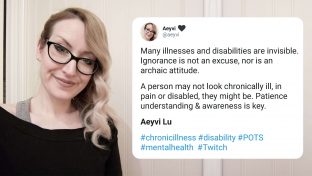The Realities Of Senior Loneliness And How Millennials Can Help

The “golden” years aren’t so golden for our elderly, with 1 in 3 seniors reporting feeling lonely. The solution? Bringing seniors and millennials together.
- One in every three senior citizens reported feeling lonely and 28% of seniors live alone.
- Loneliness increases seniors’ mortality rate by 22% and also increases their risk of dementia — not to mention manking other negative effects on their overall health.
- Senior citizens generally enjoy spending time with younger people, which can minimize loneliness and isolation for both generations.
Struggling with loneliness or having a mental health crisis?
- Suicide Prevention Lifeline: 1-800-273-TALK (8255); Deaf or hard of hearing dial 711 before the number or connect via online chat
Following the death of my grandpa last year, my grandma has found herself living alone for the very first time in her long life.
Growing up as one of a dozen siblings, she married soon after graduating from college and spent nearly 57 years with my grandpa at her side.
After he passed away, however, my grandma had to adapt to living on her own. She has done this with strength and grace, but living by herself has often been a lonely experience for her, though I’m sure there are elements of solitude she appreciates at times.
Many of us look forward to our “golden years” — an era when we will no longer have to worry about maintaining gainful employment and can instead travel the world, focus on hobbies, or spend time with loved ones.
In reality, the so-called golden years really aren’t so golden for many of our elderly, with one in three seniors reporting feeling lonely.
How Seniors And Millennials Can Work Together To Alleviate Their Loneliness

Every senior’s situation is different, however, there are various ways that older and younger generations can work together to lessen their collective loneliness.
People Of All Ages Should Connect With One Another
Intergenerational relationships are incredibly valuable, as both parties have an opportunity to learn from one another.
For retired seniors who struggle with loneliness, there are various organizations — including Little Brothers Friends Of The Elderly and Meals On Wheels — that connect seniors with millennials and other young people.
Millennials, who often struggle to make connections with people and deal with their own form of loneliness, also benefit by volunteering with organizations that are focused on connecting with the seniors in their communities.
Whenever I volunteer, whether I’m working at a food pantry or helping to organize a convention, one of my favorite parts is having the opportunity to meet so many people I wouldn’t have met otherwise.
I’m fairly introverted by nature, so it’s unlikely that I would approach a lonely senior just to chat under normal circumstances.
However, when I volunteered to help organize a convention for a nonprofit organization, I didn’t have time to think about being nervous or shy over social interactions.
Instead, I focused on answering questions and touring seniors and other attendees around the convention center.
Whenever I had a question myself, I was especially thankful for the elderly volunteers — they were more than happy to help and were experienced volunteer veterans who offered guidance.
Outside of volunteering, millennials and seniors can also benefit from talking to family members or friends outside of their own generations.
Studies suggest that the majority of senior citizens genuinely enjoy spending time with younger people, an activity that can minimize their loneliness and isolation.
By spending time together, seniors can help to shape the way millennials look at the world and since millennial loneliness is so common, both generations greatly benefit from this connection.
As a child — and still as an adult — listening to my grandparents tell stories about their own lives has always been something I have cherished.
I particularly love hearing my grandma talk about her time in college.
She was the only girl in her family who attended college, but due to a leg injury, she fought to make her way through the hilly campus using crutches.
Decades later, I attended the same college. The school was no longer exclusively a women’s college as it was when my grandma attended, and it was thankfully more accessible to the disabled.
Walking through the same beautiful, mountainous campus, I felt as if I still had a part of my family right there with me, and it made me feel much more at home.
Comparing the world as it is now to the way it once was is an activity that usually ends up teaching something of value to my grandma and me while bringing us closer together at the same time.
Senior Citizens Shouldn’t Hesitate To Ask For And Offer Help
Whether you need a ride to an appointment, some advice on the latest technology, or just want some company, it’s okay for seniors to ask for help!
Asking for assistance isn’t always easy, especially for seniors who worry about being a burden on their loved ones.
Though you may need help doing things that once came easily to you, it’s important to remember that everyone, regardless of age, needs a helping hand sometimes.
Growing up, my family always made it clear to me that we were there to help one another.
Everyone in our family has always loved to spend time with each other, even while completing a boring or difficult task like cleaning out a shed, setting up decorations, or moving furniture.
When it comes to asking for help, though, everyone in my family — from every generation — will sometimes hesitate before doing so.
Over time, I’ve realized that we all need each other.
Though elderly people may feel like they’re “always” asking for help, the truth is that we all exchange favors with one another. We don’t keep score, because none of us can do it all alone — and that’s okay.
Whether you’re a senior citizen, a millennial, or somewhere in-between, the more willing you are to ask for help and offer help, the easier life becomes.
When it comes to the people you love, try to remind yourself that your loved ones genuinely want to be around you, regardless of the situation that’s drawing you together.
The Realities Of Loneliness In Seniors
Life for most seniors isn’t as picturesque as many people might imagine.
Although retired senior citizens have more time to follow their hobbies and other pursuits, having an abundance of free time to themselves can also cause feelings of loneliness.
Elderly loneliness is a common problem for a variety of reasons and for many seniors, loneliness doesn’t just have one singular cause.
According to the U.S. Census Bureau, an estimated 28% of seniors live alone — a living situation that can intensify feelings of loneliness.
While living alone doesn’t necessarily lead to loneliness in elderly people, another factor to consider is a lack of mobility.
Since my grandmother lives in a rural area and uses a mobility scooter, getting out of the house isn’t always easy. She doesn’t mind spending time by herself, but sometimes, the house is just a little too quiet.
For senior citizens who struggle with mobility and whose social interactions primarily occur outside of the home, venturing out into the world takes effort and planning — if they can leave at all — potentially making feelings of loneliness more acute.
During a crisis, feelings of loneliness and anxiety can increase for seniors, especially for those who live alone or who spend most of their time by themselves.
Even for seniors who have supportive loved ones nearby, feelings of isolation and loneliness can be particularly overwhelming under stressful circumstances, like during the COVID-19 pandemic.
Unfortunately, statistics show loneliness can also have negative effects on seniors’ health over time.
Loneliness increases seniors’ mortality rate by 22% and also increases their risk of dementia.
In addition, struggling with a disability, chronic illness like cancer, or simply an aging body that isn’t quite as strong as it once was can be a lonely experience all on its own.
Some lonely senior citizens choose to isolate themselves as a way to ignore or cope with the reality of their situation, while some do it because they don’t want to feel like a burden to others.
A family member of mine who works in the medical field often works with senior patients.
Time and time again, she sees patients who desperately want to remain independent and who won’t ask for help — even if their health is the ultimate price they pay.
Social isolation in seniors also frequently results in loneliness and it can worsen their health problems — making the cycle of senior loneliness difficult to break.
Closing Thoughts
While growing older has its share of ups and downs, remaining engaged with others is essential.
By forming new relationships and maintaining existing relationships with loved ones, seniors can shift their focus away from feelings of loneliness and begin to truly enjoy their golden years.
Editor’s Note: This article is part of The Roots Of Loneliness Project, the first-of-its-kind resource that comprehensively explores the phenomenon of loneliness and over 100 types we might experience during our lives.
Find Help Now
If you’re struggling with senior loneliness, we’ve put together resources to meet you wherever you are — whether you want someone to talk to right now, or are looking for longer-term ways to help ease your loneliness.
- Suicide Prevention Lifeline: 1-800-273-TALK (8255); Deaf or hard of hearing dial 711 before the number or connect via online chat
- Resources & Emotional Support For Loneliness
- Volunteer & Pet Adoption Opportunities






